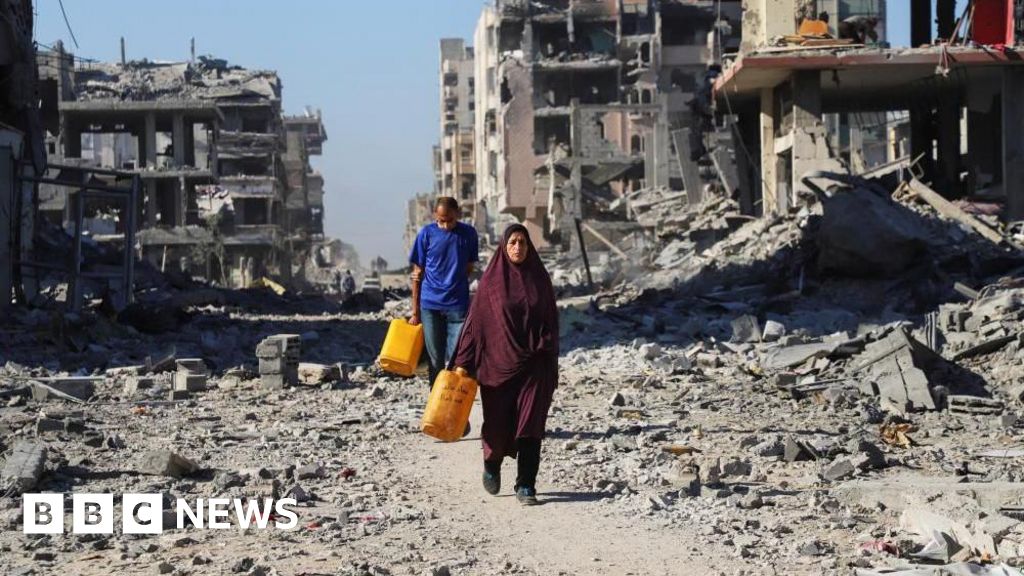The UN humanitarian chief has urged Israel to open more crossings into Gaza to allow a surge of aid, after Israel warned it would limit supplies into the territory over delays from Hamas in releasing the bodies of deceased hostages.
Tom Fletcher called on both Israel and Hamas to implement the terms of the ceasefire agreement, saying it was “essential that we do not squander the immense progress made” through the US-brokered deal.
There has been growing anger in Israel over the delayed return of hostages’ bodies, and the key Rafah crossing between Egypt and southern Gaza remained closed on Wednesday.
In Gaza, people have been stockpiling food as prices surge over fears the ceasefire may not hold.
Humanitarian aid has been entering Gaza since the ceasefire deal took effect on 10 October, but Israel threatened to restrict supplies after Hamas did not return the bodies of all 28 deceased hostages by Monday, as agreed. Hamas says it has had difficulty locating the remains.
So far, seven hostages’ bodies have been returned to Israel from Gaza. Hamas said it would return two more bodies later on Wednesday.
In a post on X, Fletcher said Hamas must “make strenuous efforts to return all the bodies of the deceased hostages”.
He added: “As Israel has agreed, they must allow the massive surge of humanitarian aid – thousands of trucks a week – on which so many lives depend, and on which the world has insisted.”
He called for “more crossings open and a genuine, practical, problem-solving approach to removing remaining obstacles” and said “withholding aid from civilians is not a bargaining chip”.
The Rafah crossing has largely remained closed since fighting broke out after the 7 October 2023 attacks.
US President Donald Trump’s 20-point peace plan stipulated that opening the crossing would be “subject to the same mechanism implemented” during a temporary ceasefire earlier this year. Then, it reopened briefly to allow wounded Palestinians to be evacuated for medical treatment.
Meanwhile, an official from Cogat, the Israeli military body in charge of aid for Gaza, said on Tuesday: “Humanitarian aid will not pass through the Rafah crossing. No such agreement has been reached at any stage.”
The UN chief also said he was “gravely concerned by the evidence of violence against civilians in Gaza”.
Reports of masked Hamas gunmen executing eight Palestinians in public have triggered fear and outrage among residents of Gaza.
Adm Brad Cooper, head of US Central Command, called on Hamas to “suspend violence and shooting at innocent Palestinian civilians in Gaza” in a post on X. He urged the group to seize “an historic opportunity for peace” by “fully standing down, strictly adhering to President Trump’s 20-point peace plan and disarming without delay”. Hamas has said it is targeting “criminals and collaborators with Israel”.
Food prices have surged in Gaza as Palestinians stockpile food, concerned that the ceasefire deal will not hold.
Traders and suppliers in the enclave have been hoarding food items to create shortages and drive up profits, fearing that the war could resume, local residents told the BBC.
“Every time we start to feel safe, new threats appear, and we fear the war will start all over again,” says mother-of-six Neven Al-Mughrabi, a displaced resident from Gaza who lives in Khan Younis.
“I lost my house in Gaza City, I decided to stay here with my family because I don’t trust the ceasefire and we’re sick of displacement.”
She added that a trader in Khan Younis’s main market said demand for flour, oil and sugar had surged within hours. “Despite the sudden rise of prices by about 30%, people are buying as if they don’t trust the calm will last long, everyone is afraid aid will stop,” Neven says.
Father-of-six Khaled Halas, who lives in Deir al-Balah, said there was “no water, no electricity and no tents”.
Halas was displaced from the Shuja’iyya area of Gaza City and has been forced to move many times.
“The Shuja’iyya [area] is completely closed. I went to the vegetable market where gunfire broke out, we have no protection,” he said. “There is constant shooting in our area, and life there is completely destroyed.”
The growing unease comes as mediators meet in Egypt in a bid to bridge differences between Hamas and Israel, and keep the first phase of the ceasefire deal on track.
The Israel Defense Forces (IDF) said on Wednesday that one of four bodies handed over by Hamas overnight “does not match any of the hostages” following examinations at the National Institute of Forensic Medicine. The other three bodies have been identified as Tamir Nimrodi, 20, Eitan Levy, 53, and Uriel Baruch, 35, the Hostages Families Forum said.
The ceasefire agreement appears to acknowledge that Hamas and other Palestinian factions may not have been able to find all hostage remains before the initial deadline on Monday.
Under the agreement with Hamas, Israel agreed to hand over the bodies of 15 Palestinians in return for every deceased Israeli hostage.
Israel has returned the bodies of a further 45 Palestinians, the Hamas-run health ministry confirmed on Wednesday. This brings the total number of bodies released by Israel to 90.
The delay in the return of the bodies of Israeli hostages has led to anger in Israel. The son of Amiram Cooper – one of the deceased Israeli hostages whose body is still being held in Gaza – said that he and other hostage relatives are trying “to find the strength somehow to pick ourselves up… and continue the fight”.
“It’s clear to us that they [Hamas] could have and should have released more and they’re playing games,” Rotem said.


